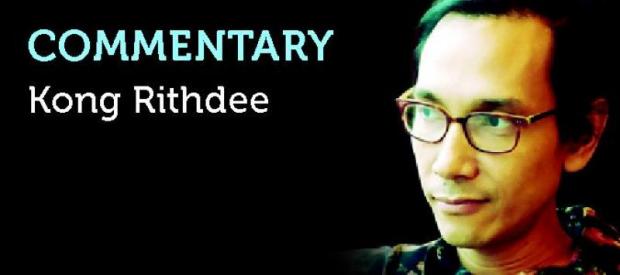'Top Muslim lawyer disappears. Believed abducted for opposing martial law," read a headline in this newspaper 13 years ago.
On March 12, 2004, Somchai Neelapaijit was last seen in Ramkhamhaeng. Eyewitnesses saw four men drag him from his car. No one has seen him since. Tomorrow marks the 13th anniversary of his disappearance -- isn't that oxymoronic, an anniversary of something invisible, for someone who wasn't here?
Or maybe he is. To remember is to make someone exist. To forget is to condemn him to the dustbin of memory, to collective oblivion.
Every year friends and family organise an event to remember Mr Somchai. Today people are gathering at the Pridi Banomyong Institute in Thong Lor for "Somchai Where? Where's Somchai?", held not just to honour him with memory but also to reflect on the way justice works, or doesn't work, in cases of human rights violations and enforced disappearances. The event includes the announcement of the Somchai Neelapaijit Award for human rights defenders.
Mr Somchai had been working in law for 30 years and, at the time of his disappearance, was representing five Muslim suspects allegedly involved in the army camp raid in Narathiwat in January 2004, the incident that blew up into the interminable unrest in the far South. He was also vociferous in his call for the army to end martial law in the troubled region, which remains in effect today.
"PM defends handling of Somchai's case. Hasn't forgotten, but justice takes time," read a headline in this newspaper in March 2005. The PM was Thaksin Shinawatra.
Time? The ex-PM must know a lot about time, because his exile that was supposed to last a weekend has turned out to last a lifetime. But at least Thaksin still exists as a man and phantom, whereas Mr Somchai suffered a far worse fate: he's not even a shadow.
"Hasn't forgotten," the ex-PM said then. It's ironic that most people here have never forgotten about Mr Thaksin while the memory of Mr Somchai -- and of other victims of enforced disappearance case -- is slowly slipping away. This week, the brouhaha is about whether the ex-PM will be forced to pay tax for selling his shares -- that's the headline (besides the monk thing), while Mr Somchai's case has become something like the Israeli-Palestinian conflict: tired, stale, remote, evanescent, irrelevant.
"Somchai is dead, says Thaksin. Cites 'DSI's evidence,'" read a headline in this newspaper in January 2006.

That year, the Criminal Court sentenced Pol Maj Ngern Thongsuk of the Crime Suppression Division to three years in jail for his connection with the disappearance. Four other suspects, all policemen accused of robbery and illegal use of force, were acquitted.
That glimmer of hope -- of justice -- would later be quashed. In a bizarre development, Pol Maj Ngern disappeared and his family testified that he died in a landslide accident. Later, the court declared him a missing person.
Justice takes time. But injustice also takes time -- time that's usually more painful and implacable. One simply wonders if the man was believed dead, as Thaksin said, who killed him? It was ridiculous enough that the lawyer just disappeared without even a puff of smoke, now that it took on the semblance of a murder, the effort to bring in the perpetrators was futile, reluctant, and finally discontinued. And this is such a high-profile case that inexcusably tangles with the larger issues of human rights, deep South violence, and the culture of impunity this country is notorious for -- if this one went down the drain, then what hope would it be for "smaller" cases of activists being made disappear?
"Angkhana still waiting for justice. Missing lawyer's case up in air, 10 years on," read a headline in 2014.
The report went on to say that "after 10 years and six prime ministers, the wife of the missing lawyer is still waiting for an apology from state officials … and for progress in the prosecution of those allegedly involved with the case".
"Court acquitted Somchai case cops," reads a headline in December 2015, the headline that sounds like a final blow to the most controversial case of missing person in modern Thai history.
The Supreme Court let the five suspects walk free -- four actually, since one "died" in a landslide.
But no, it's not the end. We can't let it be. As long as the memory of Mr Somchai and what he did is honoured, and as long as history doesn't consign him into the black hole that threatens to suck Thailand into epic amnesia, the lawyer will still be here. Not in the flesh but as a force. That's the only way that we celebrate human rights.
Kong Rithdee is Life Editor, Bangkok Post.
